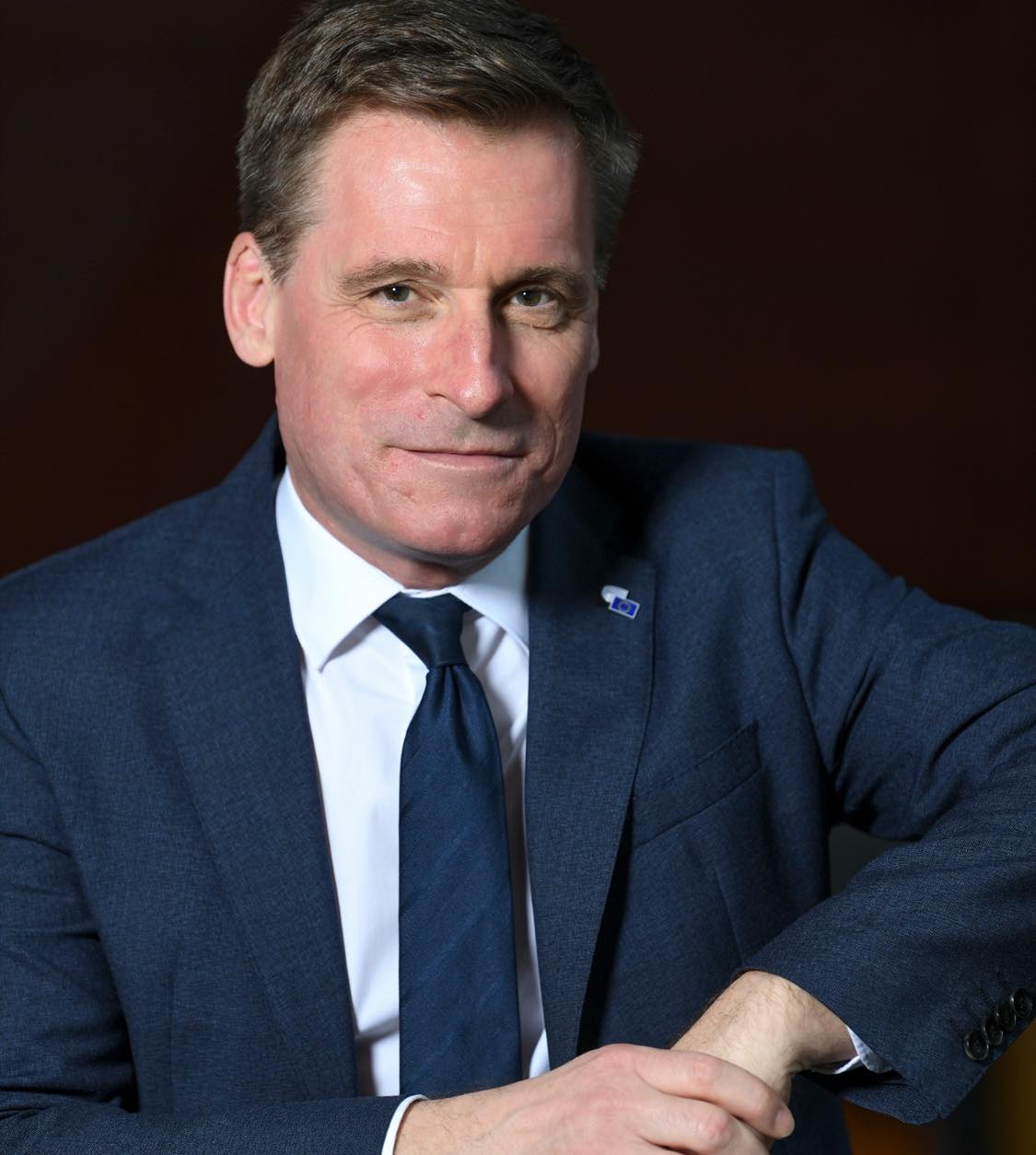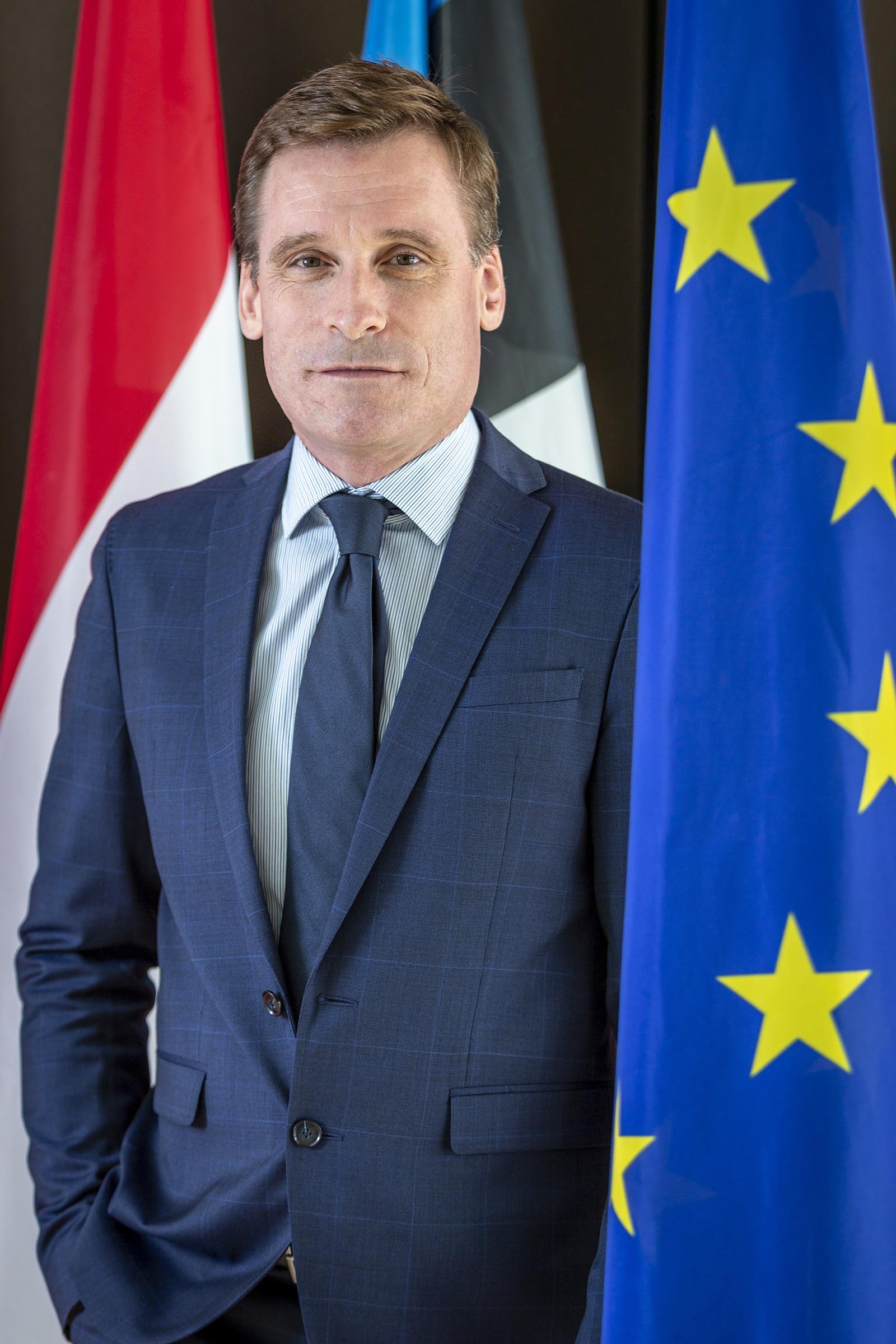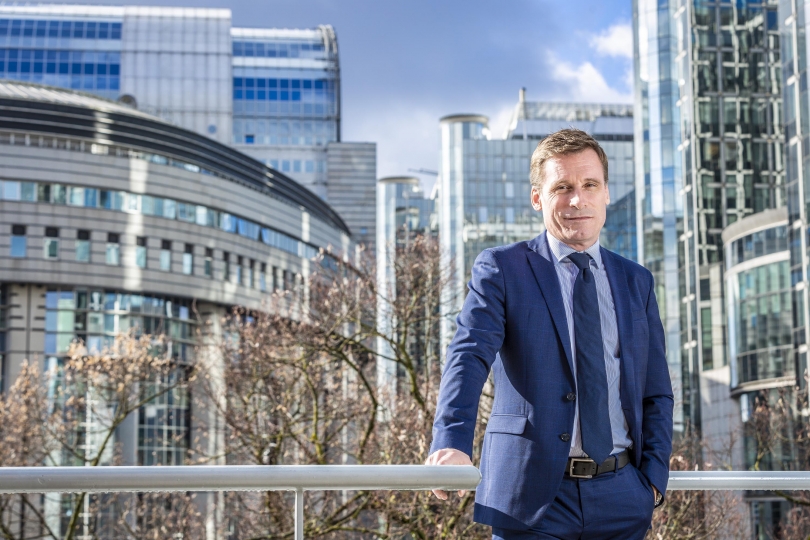Oliver Röpke, President of the European Economic and Social Committee (EESC): The EESC is aware of the brain drain in Croatia and calls for targeted measures to encourage return migration

Oliver Röpke is an Austrian trade unionist and social activist, renowned for his long-standing advocacy for workers' rights and social justice within the European Union. He has been serving as the President of the European Economic and Social Committee (EESC) since 2023, where he represents the interests of workers at the European level.
Prior to this, Röpke was the representative of the Austrian Trade Union Federation (ÖGB) to the European Union, dealing with issues such as social policy, workers' rights, and European integration. His career has been marked by a strong commitment to social issues, and through his work at the EESC, he seeks to strengthen dialogue between civil society and European institutions, with a particular focus on social cohesion and sustainable development.
We had the privilege of discussing several topics for the media outlets of Business Media Group, Udruga.hr, and Poslovni savjetnik.
What are the biggest challenges currently facing the European Union in terms of workers' rights and social policy?
Oliver Röpke: The European Union is confronting a series of significant challenges in the realm of workers' rights and social policy. The high cost of living, inflation, migration pressures, the climate crisis, and the lingering effects of geopolitical tensions, including wars on our doorstep, are intensifying these challenges. At the heart of our response must be an unwavering commitment to the European Social Model, a model that champions dignity, fairness, and equal opportunity.
We must ensure that every European has access to quality employment, decent working conditions, and the ability to upgrade their skills. However, disparities between countries and regions in terms of employment and inactivity persist.
The EESC is pressing for stronger, more inclusive labor markets that remove barriers for women, young people, the elderly, people with disabilities, and those from migrant backgrounds. Gender inequalities, in particular, remain a serious concern. Women continue to face wage gaps and underrepresentation in leadership, exacerbated by the disproportionate burden of caregiving. We are advocating for stronger integration of the gender perspective in all policies.
Youth unemployment also remains high, and many young people are forced into precarious work. The EESC opposes youth-specific minimum wages and stresses the importance of creating stable, quality jobs for young workers.
The rise of new forms of employment, such as platform work, presents another challenge. These jobs often come with insecure conditions and lack social protections. The EESC has called attention to this erosion of workers’ rights and is demanding stronger protections at the EU level.
Moreover, the ongoing digital and green transitions, while necessary, must be accompanied by significant investments in skills to ensure no one is left behind. Closing the digital skills gap is essential, with only 26% of the EU population currently possessing advanced digital skills.
Through collaboration and commitment to our shared values, we can overcome these challenges and strengthen the social fabric of Europe.

How do you assess the impact of the COVID-19 pandemic on the labor market in the European Union, particularly in terms of long-term changes?
Oliver Röpke: The COVID-19 pandemic has left an indelible mark on the European labor market, accelerating existing trends and exposing vulnerabilities that require immediate attention. In the short term, the pandemic caused widespread economic disruption, with sectors like tourism, hospitality, and retail suffering significant job losses. The European Union acted swiftly, implementing measures such as the SURE program to protect jobs and incomes. Yet the long-term implications are profound.
One major shift has been the rapid adoption of remote and hybrid work models, which have transformed the way we work. While offering flexibility, these models also raise concerns about workers' rights, such as the right to disconnect. The EESC has stressed the importance of safeguarding the mental and physical well-being of workers, calling for stronger protections around working hours and the right to disconnect.
The pandemic also highlighted and exacerbated existing social inequalities. Women, migrants, and those in precarious jobs bore the brunt of the crisis, with women, in particular, facing increased caregiving responsibilities. This has widened the gender employment gap, underscoring the need for robust social protection systems and policies that promote work-life balance.
Looking ahead, the need for reskilling and upskilling has never been more urgent. As digitalization and automation continue to reshape industries, workers must be equipped to adapt to new technologies.
The EU's recovery strategy, including the NextGenerationEU fund, places a strong emphasis on investing in digital skills and green jobs, ensuring that Europe’s workforce is prepared for the future economy.
In summary, the pandemic has reshaped the EU’s labour market, revealing both the strengths and shortcomings of our social systems. It is now imperative that we address these long-term changes with policies that promote resilience, fairness, and inclusivity.
What measures does the European Economic and Social Committee propose to mitigate social inequalities within the EU, especially between older and newer member states?
Oliver Röpke: The European Economic and Social Committee (EESC) has long been a vocal advocate for reducing social inequalities within the European Union. These disparities, particularly between older and newer member states, pose a serious threat to social cohesion and economic stability. Our primary tool for addressing these inequalities is the full implementation of the European Pillar of Social Rights (EPSR). This framework is essential in ensuring fair wages, safe working conditions, and equal access to social protections across all member states.
The EESC is calling for the EPSR Action Plan to be fully utilized to build more equal, sustainable, and resilient societies. By promoting common standards in employment and social services, we can help reduce the gaps between Western and Eastern European countries. Our recent resolution highlights the importance of the Social Convergence Framework in the European Semester, which allows for deeper analysis and better alignment of social and employment policies across the Union.
Moreover, investing in education, training, and reskilling is critical.
The EESC advocates for robust vocational training programs, particularly in emerging sectors like digital and green technologies. This is especially important for newer member states, where the transition to greener industries is ongoing.
We also emphasize the need for fair cross-border labour mobility, ensuring that posted and mobile workers enjoy the same protections as local workers.
The EESC is acutely aware of the brain drain experienced by countries like Croatia and calls for targeted measures to encourage people to return to their home countries, thereby enriching both their origin and destination economies.
Finally, targeted funding through the Cohesion Fund and the European Social Fund Plus (ESF+) is essential. These funds must be directed towards less-developed regions, ensuring that economic development is both inclusive and sustainable

What role do you see for trade unions in the modern European Union, especially in the context of digitalization and automation?
Oliver Röpke: Trade unions are indispensable to the European labour landscape, particularly in this era of digitalization and automation. As artificial intelligence, digital platforms, and automation reshape traditional work environments, unions have a critical role in safeguarding workers’ rights, ensuring fair transitions, and addressing the emerging challenges.
One of the primary concerns is the rise of gig and platform work, where many workers face precarious conditions, lack social protection, and have limited access to collective bargaining. The EESC, in line with its recent resolution, is preparing an opinion on artificial intelligence in the world of work and will use foresight techniques to assess how trade unions can prevent the negative impacts of digitalization.
We are calling for policies that ensure platform workers receive the same protections as traditional employees, including access to social security, fair wages, and the right to organize.
Trade unions also play a vital role in promoting lifelong learning and reskilling. As automation transforms industries like manufacturing and retail, unions must collaborate with employers and governments to design training programs that help workers adapt to these new realities. The EESC supports these efforts by advocating for policies that prioritize upskilling in sectors most affected by automation.
Moreover, social dialogue remains at the core of the European social model. Unions must be actively involved in discussions with employers and EU institutions to ensure that the benefits of technological advancements are shared equitably across the workforce. The EESC is committed to strengthening this dialogue, ensuring that workers’ voices are heard as we navigate the digital transformation.
In summary, trade unions will continue to be pivotal in ensuring that Europe’s transition to a digital economy is fair, inclusive, and just for all workers.
What are the main obstacles to strengthening social cohesion within the European Union, and how can they be overcome?
Oliver Röpke: The European Union faces several key obstacles to strengthening social cohesion, primarily driven by economic disparities, regional inequalities, and inconsistent social policies across member states. The uneven implementation of the European Pillar of Social Rights (EPSR), which sets out fundamental principles such as fair wages and access to healthcare, compounds these challenges. These disparities hinder upward social convergence—a critical goal for the Union’s future.
Additionally, the rise of nationalism and Euroscepticism in some regions, coupled with resistance to EU-wide regulations, hampers collective action on critical issues like labour mobility and migration. This fragmentation poses a serious threat to the unity and cohesion of the EU.
To address these challenges, the EESC is calling for the full implementation of the EPSR, ensuring that social protections and labour standards are applied consistently across all member states. Moreover, stronger EU funding through cohesion and structural funds—such as the European Regional Development Fund (ERDF) and the European Social Fund Plus (ESF+)—is essential to helping less developed regions catch up economically and socially.
Social dialogue is another key tool in overcoming these obstacles.
By bringing together trade unions, employers, and civil society, we can create more inclusive and flexible policies.
The EESC emphasizes that fostering a culture of solidarity through education and pan-European initiatives will help bridge cultural divides and strengthen a shared European identity.
Through these collective efforts, we can ensure that all regions and citizens of the European Union benefit from shared prosperity and progress.

How does the European Economic and Social Committee promote workers' rights?
Oliver Röpke: The European Economic and Social Committee (EESC) plays a pivotal role in safeguarding and advancing workers' rights across the European Union. Our mission is to ensure fair labor standards, inclusive social policies, and strong social dialogue at both the national and EU levels.
Central to our advocacy is the full implementation of the European Pillar of Social Rights (EPSR), which the EESC has consistently supported since its adoption.
We firmly believe that the EPSR's key principles—including fair wages, safe working conditions, and access to social protection—must be integrated across all member states.
As we prepare for the 2025 revision of the EPSR Action Plan, the EESC is contributing new recommendations to strengthen its impact.
The EESC also focuses on addressing the challenges posed by the platform economy and digitalization. Workers in these sectors often face precarious conditions, limited social protections, and fragmented working hours. We have issued several opinions calling for stronger regulation and protections for platform workers, ensuring they receive adequate social security, health benefits, and collective rights.
Moreover, the EESC is deeply committed to promoting teleworking rights, particularly in the context of work-life balance, health and safety, and the right to disconnect.
As telework becomes more common, we are advocating for policies that ensure teleworkers, especially women, are not disadvantaged.
Through these efforts, the EESC ensures that workers' rights remain a cornerstone of the European social model, even in the face of evolving economic conditions.
How can the European Union better adapt to the needs of the labor market in the context of green policies and the transition to a sustainable economy?
Oliver Röpke: As the European Union transitions towards a sustainable, green economy, adapting the labor market to these new realities is both a challenge and an opportunity. The ambitious targets of the European Green Deal require a fundamental transformation of industries, and this will inevitably reshape labor markets across the EU.
The first priority is reskilling and upskilling workers, particularly those in sectors most vulnerable to job losses due to decarbonization, such as coal mining and heavy manufacturing. The EESC has consistently advocated for substantial investment in training programs to ensure workers are prepared for jobs in green sectors like renewable energy and energy efficiency. The Just Transition Fund, alongside the European Social Fund Plus (ESF+), will play a crucial role in supporting workers and regions affected by the shift away from carbon-intensive industries.
Job creation in green industries is another key aspect.
The EU is expected to generate millions of jobs in sectors like sustainable agriculture, renewable energy, and energy-efficient construction.
To foster this, the EESC calls for stronger incentives for businesses to invest in green technologies, alongside initiatives that promote entrepreneurship in these sectors.
Crucially, the transition must be socially inclusive. As the EESC has emphasized, “there can be no Green Deal without a Social Deal.” We must ensure that vulnerable workers, particularly those in rural or less developed regions, are not left behind. This requires policies that provide equal access to green jobs and support for workers displaced by the transition.
With the right investments and policies, the EU can lead the way in creating a sustainable and inclusive labor market for the future.

How does the EESC work with other European institutions to ensure that workers have adequate protection in all member states, including Croatia?
Oliver Röpke: The EESC collaborates closely with other European institutions to ensure that workers across the Union, including in Croatia, receive adequate protection. Our partnerships with the European Commission, the European Parliament, and the Council of the European Union are essential to influencing policy and legislation that safeguards workers' rights.
As a consultative body, the EESC provides expert opinions on legislative proposals, ensuring that the perspectives of workers, employers, and civil society are represented.
For example, we are currently preparing key opinions on the future of artificial intelligence in the workplace, as requested by the European Commission. These opinions will help shape policies that protect workers from the potential risks posed by AI and digitalization.
The EESC also plays an important role in monitoring the implementation of EU labour laws. Through bodies like the Labour Market Observatory and the European Semester, we assess how member states enforce directives on workers' rights, providing feedback and recommendations for improvement. This ensures that protections are not only enacted but effectively implemented across the Union.
By working in close cooperation with the EU institutions, the EESC ensures that the interests and rights of workers remain a central focus of European policy.
Given the growing trend of remote work, what changes do you expect in European Union legislation regarding working conditions?
Oliver Röpke: The rise of remote and hybrid work has fundamentally transformed the European labor landscape, and I expect that EU legislation will evolve to address this new reality. The European Pillar of Social Rights must be fully realized to ensure that remote and hybrid workers enjoy the same protections as those in traditional workplaces.
One of the most pressing issues is the need for a right to disconnect. The EESC has long supported this measure, which was also called for by the European Parliament in 2021.
As teleworking becomes more widespread, it is critical that workers have clear boundaries between their professional and personal lives, protecting their mental health and well-being.
Furthermore, the organization of working time, health and safety risks, work-life balance, and the overall effectiveness of labour rights in the context of remote work must be addressed. The EESC has urged Member States to develop robust national frameworks for teleworking, in cooperation with social partners, to ensure these issues are adequately managed.
Looking ahead, I expect that the European Commission will propose a comprehensive roadmap for quality jobs, developed with input from social partners. This roadmap will focus on fair wages, training, and ensuring fair transitions for workers, particularly as the digital and green transitions reshape the labour market.
How can the European Union ensure fair access to social services for all its citizens, including those from less developed regions?
Oliver Röpke: Ensuring fair access to social services is a fundamental challenge for the European Union, particularly for citizens in less developed regions and vulnerable groups. The EU can address this through a combination of targeted financial support, policy harmonization, and enhanced regional cooperation.
First, the EU’s Cohesion Policy plays a critical role in reducing regional disparities. Funds like the European Regional Development Fund (ERDF) and the European Social Fund Plus (ESF+) are essential in supporting projects that improve infrastructure, education, healthcare, and social inclusion. Expanding these funds' reach is key to ensuring equitable access to services.
Second, policy harmonization is necessary to ensure that basic social services—such as healthcare and education—are accessible to all citizens. Establishing minimum standards for social services across the Union will help reduce the gaps between more and less developed regions. The EESC, in particular, has advocated for the inclusion of accessible social services for people with disabilities, ensuring that these services are both affordable and available in digital and physical formats.
By combining financial support, policy reform, and regional cooperation, the EU can foster a more inclusive system where all citizens, regardless of their location, have fair access to essential services.

What do you see as the key challenges for young workers in the European Union, and how can they be addressed through policy and legislation?
Oliver Röpke: Young workers in the European Union face significant challenges that threaten their long-term prosperity and integration into the labour market. High youth unemployment, precarious employment conditions, and the widening gap between skills and labour market demands are among the most pressing issues. These challenges are particularly acute in Southern and Eastern Europe, where many young people find themselves in temporary or part-time jobs without social protections, leading to instability and limited career prospects.
One critical issue is the differential treatment young people often receive in the labour market. In some countries, they are paid less than the minimum wage, and they experience reduced benefits during unemployment. The EESC is calling for a reform in labour legislation and social protection systems to reflect the realities of modern work, particularly for young people engaged in gig or platform economies. We must ensure that their rights are fully protected.
Moreover, the mismatch between education and labour market needs is a serious hurdle. Many young workers are either overqualified for their jobs or lack the specific skills required in a rapidly changing, green economy. The EESC has consistently emphasized the need for greater investment in education and vocational training, particularly through programs like the Youth Guarantee, which ensures young people receive quality employment or training opportunities within months of unemployment.
I believe that effective policies for young people must actively involve them in the decision-making process. During my mandate, we have made it a priority to engage young people directly in drafting our opinions, ensuring that their voices are heard and reflected in our policies. By working together, we can create a fairer and more inclusive labour market for Europe’s young workers.
What is your position on the trends of significant immigration of foreign workers to EU Member States, like Croatia? What steps should be taken to ensure their effective integration?
Oliver Röpke: The immigration of foreign workers to EU member states, including Croatia, is a critical issue shaped by demographic shifts, labour shortages, and economic necessity. As our populations age and workforces shrink, foreign workers play an essential role in filling gaps in key sectors such as construction, healthcare, and agriculture.
The EESC believes that third-country nationals already residing in the EU represent a significant yet underutilized pool of potential workers. Many asylum applicants, individuals without work permits, or those who have come for family reunification are eager to contribute to the labour market. Supporting their integration is not only an economic imperative but also a moral one.
Effective integration requires addressing both social and economic challenges. Language training, cultural orientation, and social support are essential to help immigrants integrate into local communities. Equally important is the recognition of qualifications and access to vocational training to ensure that these workers can fully contribute to the economy. The EESC advocates for stronger recognition frameworks to facilitate this process.
It is also vital that foreign workers are afforded the same rights and protections as native workers. We must ensure that labour policies are robustly enforced to prevent exploitation, particularly in sectors prone to abuse, such as agriculture and construction. Combating xenophobia and discrimination is equally critical, and this can be achieved through anti-discrimination legislation and public awareness campaigns that promote diversity and inclusiveness in workplaces.
The European Union’s future prosperity depends on a comprehensive approach to immigration that promotes the economic contributions of foreign workers while safeguarding their rights and ensuring social cohesion.

What steps can the European Union take to strengthen its role in global labor and social justice issues?
Oliver Röpke: The European Union has a crucial role to play in promoting labor standards and social justice on the global stage. As the world's largest single market, the EU can lead by example, advocating for fair working conditions, decent wages, and the protection of human rights in the labour market.
A key part of this effort involves continuing our strong collaboration with international organizations like the International Labour Organization (ILO). I am particularly proud that the EESC is now a partner in the Global Coalition for Social Justice. This coalition brings together Member States, institutions, and civil society to push for fair global labour practices, and the EU must be at the forefront of this effort.
The EU should also integrate labour and social justice clauses into its trade agreements. By doing so, we can ensure that our trading partners adhere to fundamental labour rights, such as the right to collective bargaining, non-discrimination, and safe working conditions. Enforcing these clauses will help raise global labour standards and ensure that the benefits of trade are distributed more equitably.
Furthermore, the EU must continue to promote transparency and ethical practices in global supply chains. This includes enforcing human rights and labour laws within the production chains of European companies. The EESC is committed to ensuring that European companies uphold the highest standards when engaging with suppliers abroad.
Through these initiatives, the European Union can strengthen its leadership role in promoting fairness, dignity, and social justice around the world, ensuring that labour rights are respected not just within our borders, but globally. (ps/sm)
Interview conducted by Mr. Goran Jungvirth, MSc, for the media outlets of Business Media Group, Udruga.hr, and Poslovni savjetnik
Photos: Courtesy of the EESC
Video: https://youtu.be/f8YIp0aNNp8?si=3mnz7JyJ8mEdsJYS
Links: Oliver Röpke – Udruga.hr




























